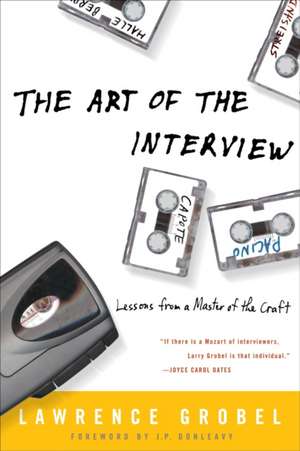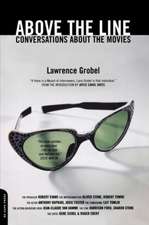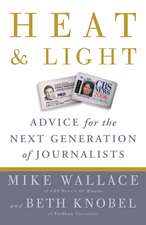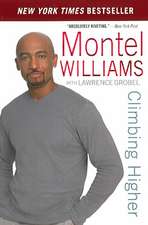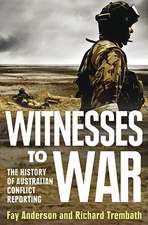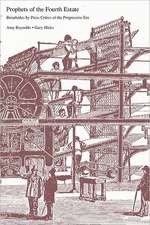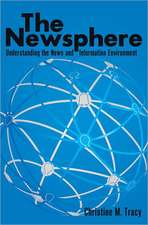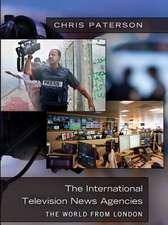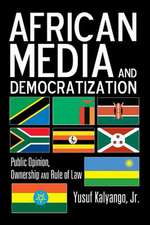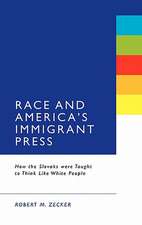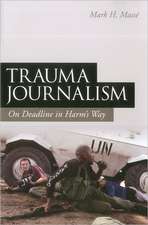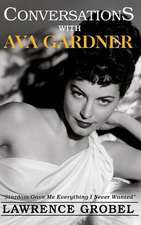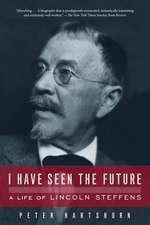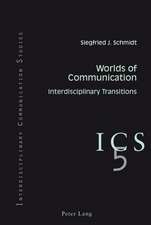The Art of the Interview: Lessons from a Master of the Craft
Autor Lawrence Grobelen Limba Engleză Paperback – 31 iul 2004
“I had a fantasy the other night that this interview is so great that they no longer want me to act—just do interviews. I thought of us going all over the world doing interviews—we’ve signed for three interviews a day for six weeks.”
—Al Pacino, in an interview with Lawrence Grobel
Highly respected in journalist circles and hailed as “the Interviewer’s Interviewer,” Lawrence Grobel is the author of well-received biographies of Truman Capote, Marlon Brando, James Michener, and the Huston family, with bylines from Rolling Stone and Playboy to the New York Times. He has spent his thirty-year career getting tough subjects to truly open up and talk. Now, in The Art of the Interview, he offers step-by-step instruction on all aspects of nailing an effective interview and provides an inside look on how he elicted such colorful responses as:
“I don’t like Shakespeare. I’d rather be in Malibu.” —Anthony Hopkins
“Feminists don’t like me, and I don’t like them.”—Mel Gibson
“I hope to God my friends steal my body out of a morgue and throw a party when I’m dead.”—Drew Barrymore
“I want you out of here. And I want those goddamn tapes!”—Bob Knight
“I smoked pot with my father when I was eleven in 1973. . . . He thought he was giving me a mind-extending experience just like he used to give me Hemingway novels and Woody Allen films.”—Anthony Kiedis
In The Art of the Interview, Grobel reveals the most memorable stories from his career, along with examples of the most candid moments from his long list of famous interviewees, from Oscar-winning actors and Nobel laureates to Pulitzer Prizewinning writers and sports figures. Taking us step by step through the interview process, from research and question writing to final editing, The Art of the Interview is a treat for journalists and culture vultures alike.
Preț: 124.06 lei
Nou
Puncte Express: 186
Preț estimativ în valută:
23.74€ • 24.78$ • 19.65£
23.74€ • 24.78$ • 19.65£
Carte disponibilă
Livrare economică 15-29 martie
Preluare comenzi: 021 569.72.76
Specificații
ISBN-13: 9781400050710
ISBN-10: 1400050715
Pagini: 480
Dimensiuni: 132 x 204 x 27 mm
Greutate: 0.5 kg
Editura: Three Rivers Press (CA)
ISBN-10: 1400050715
Pagini: 480
Dimensiuni: 132 x 204 x 27 mm
Greutate: 0.5 kg
Editura: Three Rivers Press (CA)
Notă biografică
LAWRENCE GROBEL is the author of eight books, including the New York Times bestseller Climbing Higher with Montel Williams, Conversations with Capote, and The Hustons. He teaches interviewing in the English department at UCLA and lives in Los Angeles.
Extras
1. Kinds of Interviews
Print. Books. Radio. Documentaries. Television.
A good interview should have the character of a good novel.
--Harrison Salisbury
It's hard to imagine how a nonfiction book, newspaper, magazine, or radio or television talk show or news show could exist without interviews. One person asking another a question in search of an answer, looking for information, or an anecdote, or some shared gossip. An interview is the interaction between people. Most are one-on-one, but there are roundtable interviews and group interviews. I once interviewed a high school marching band inside their school gym--I'd ask a question and point to someone, or someone would raise a hand to respond. Another time I interviewed two dozen performance artists in my living room, feeling very much the performer as I tried to ask provocative questions to already provocative artists.
The work of interviewers is everywhere.
Pumla Gobodo-Madikizela, a clinical psychologist, wrote a book called A Human Being Died That Night: A South African Story of Forgiveness. She went to Pretoria Prison to interview Eugene de Kock in 1997 for his role in the killing of three black policemen who had died when a bomb exploded in their car. De Kock was a reviled man: He had led a death squad and had tortured black South Africans. She spent six months interviewing de Kock, and then she interviewed the family of victims to prepare them for testifying at the Truth and Reconciliation trials. Her task could not have been an easy one.
Barry Mile's biography of Allen Ginsberg, Gerald Clarke's of Truman Capote, and Ted Morgan's of William S. Burroughs could not have existed without the interviews these writers did as part of their research. Each had access to his subject, as well as to the people who knew their subject. On the other hand, Richard Ellman never interviewed Oscar Wilde or James Joyce, A. Scott Berg never personally spoke with Max Perkins, Samuel Goldwyn, or Charles Lindbergh, Norman Mailer never talked to Gary Gilmore, David King Dunaway didn't know Aldous Huxley, Albrecht Folsing didn't interview Albert Einstein, Jeffrey Meyers didn't live at the time of Joseph Conrad, nor Neil Baldwin when he wrote about Thomas Edison. And yet these writers wrote biographies of these subjects, using whatever interviews and articles that existed about them, and talking to people who could enhance their portraits of them.
One could list practically every biography ever written and make the same point: that even if the subject lived a thousand years ago, there is only so much research one can do before feeling the need to talk to someone about that subject--a scholar, a friend, an enemy, anyone who has passion about or insight into the person one is trying to uncover. And that need to talk is a need to interview. Can you imagine a Studs Terkel book that didn't involve his asking questions and someone providing answers? To get the story right, one must know what to ask, how to ask, and how to listen to the answers. Without the inclusion of well-done interviews, you'd still have fiction, sitcoms, dramas, and music, but when it comes to nonfiction, so-called reality TV, and National Public Radio there would be very little to read, watch, or listen to.
Print
The most in-depth interviews usually appear in print: in newspapers, magazines, books, or online. Makes sense: Print allows more space than radio or television. You can condense most TV interviews into a few paragraphs of print. As you will see in other chapters of this book, there is more to a printed interview than transcribing what has been said and handing it to your editor. Just as most writing involves rewriting, all interviews demand editing. Words, sentences, and paragraphs will have to be moved around, cleaned up, reduced, or deleted. And almost all interviews done these days in any medium are recorded for the simple reason that the technology exists and legal departments demand accuracy.
When Norman Mailer was asked how he felt about being interviewed, he said he always sat down with a general sense of woe, because "the interviewer serves up one percent of himself in the questions and the man who answers has to give back ninety-nine percent. I feel exploited the moment I step into an interview. Of course, once in a while there is such a thing as a good interview; but even then, the tape recorder eats up half the mood. It isn't the interview I really dislike so much as the tape recorder."
Truman Capote hated tape recorders and told me he never worked with one (though I suspect his aversion might have had something to do with a general antipathy to electronics, a fear of pressing the wrong button--Play instead of Record). When he was conducting his interviews for In Cold Blood, or when he interviewed Marlon Brando in Japan during the making of Sayonara, he relied on his memory. He said he would go back to his room and write down everything that his subjects said, filling filing cabinets with his notes and research. He was meticulous, he was slow (it took him a year to write the Brando profile), but he had a good ear, and few complained that he misquoted them.
Lillian Ross prefers to "listen carefully and take notes." Nicholas Pileggi and Thomas Morgan also don't like tape recorders.
For Pileggi, who wrote the book Wise Guy: Life in a Mafia Family (which was the basis for Martin Scorsese's GoodFellas) and worked for Esquire and New York, "the problem with a tape recorder is that it exhausts you. It's stronger than you are. It throws all that stuff back at you in exactly the same way. And if you try to fast-forward it, you feel you've missed something. Before you know it, you're going bananas and you're spending all your time with the tape recorder."
Morgan, who has published nonfiction and fiction, and wrote for Harper's, Look, Esquire, and Holiday, feels it's inhibiting. "The interviewee is inhibited by the fact that he's on record in a way that he doesn't feel when you're sitting there scribbling away. Part of that, of course, is understandable because he can always say, 'You got it down wrong.'"
Exactly. I once did a story about mail-order entrepreneurs and spoke to the owner of a business who proudly showed me a book he published for 60 cents and sold for $9. When the article came out, he called my editor and denied he had said the things I had him saying. I was in Florida on another assignment when my editor called to warn me: "He's threatening to sue us." "Let him," I said, "it's all on tape." The businessman must have had a lapse of memory and forgot that I was recording our conversation, because once he was reminded he withdrew his complaints.
A similar thing happened some years later when I interviewed Vincent Bugliosi for Playboy. This was after O. J. Simpson had apparently gotten away with murder (or so many people, including Bugliosi, thought) and the former L.A. prosecutor had a lot to say about that and other matters. But while the interview was still in galleys Bugliosi managed to obtain a copy and let the powers that be at the magazine know that he didn't say any of the things I had him saying. He was so upset that he crossed out most of the interview and rewrote his answers. My editor called to ask me if everything I had Bugliosi saying was on tape. I said it was. He then told me what Bugliosi had done and I said that if Bugliosi was allowed to change our interview then I wanted my name removed (this had already happened once before, I later found out, when Bugliosi was interviewed by David Sheff and Sheff had his name removed from the final piece). In the end, Playboy published the interview as I had given it to them. I never heard from Bugliosi, and if I was ever asked to interview him again, I would politely decline.
The first celebrity I ever interviewed, Mae West, wouldn't let me use a tape recorder. When I took it out, I might just as well have unzipped my fly--the look of shock on her face was that succinct. "Oh no, oh no, you can't use that, put it away."
"But this is an interview," I stammered. My first such interview for Newsday's Sunday magazine. "Don't you want me to be accurate?"
"I once allowed one of those to be used," she told me in that famous nasal tone, "and the reporter made a record out of it. I won't let that happen again."
"Can I sign something that says I won't turn our conversation into a record?" I asked. She had caught me completely off guard with her insistence that there be no recording of our interview.
"Just put it away," she said, "and ask me your questions."
Luckily I had taken a pad with me, because I filled it up that day. I worked through the night to try and get her voice right when I wrote the story.
Ray Stark, who produced four of John Huston's movies, also had an aversion to having his voice captured on tape. When I went to talk to him about The Night of the Iguana, Reflections in a Golden Eye, Fat City, and Annie for my book The Hustons, he looked at my tape recorder as if it was rotted meat. "I can use a pad," I told him, "but I don't understand why you wouldn't want to insure being quoted accurately."
"I just don't like those things," he said. But after he warmed up to talking he allowed me to turn it on.
Ava Gardner, who was in The Night of the Iguana, also hated tape recorders. When I went to see her in London she told me she couldn't talk with a tape recorder on the coffee table between us. It made her too self conscious. So I put the machine under the table, out of her sight, and that seemed to work.
Three people I've interviewed pulled out tape recorders of their own: Jerry Lewis, George C. Scott, and Elizabeth Hurley. They didn't trust journalists and felt they were misquoted in the past. "I do this because I've been fucked," Lewis told me. "And I don't like getting fucked by reporters." Hurley said after being involved in a lawsuit against a tabloid she was under instruction from her lawyer to record everything she said to the media. Scott never gave a reason for his taping; he just turned his machine on, then drank his Bloody Marys and forgot all about it. He never turned the tape over or bothered changing tapes during the many hours we spent on two coasts talking.
Though I respect the work of Capote, Pileggi, and Morgan, I don't agree with them about tape recorders. I also don't think a good journalist should solely rely on them. When I was writing articles for Newsday's Sunday magazine in the early seventies, I interviewed a man named Slim Hennicke for a piece about the history of aviation on Long Island. Hennicke was a barnstorming pilot at the turn of the twentieth century, and he had wonderful tales of parachuting from biplanes holding on to a billowing piece of canvas and then passing a hat around to the spectators after he had safely landed. His basement was crammed with aviation memorabilia, and we spoke for a few hours among his busts of Lindbergh and Clarence Chamberlin, among the wooden propellers and leather helmets and rusted engines that flew those historic planes. When we broke for lunch I went across the street to a diner and checked my equipment. I discovered that my tape recorder had not recorded a single word Hennicke had spoken. What I learned was that before a battery went completely dead it could still generate enough power to turn a tape, but not enough to record anything. I didn't think I could ever replicate what Hennicke had told me from memory, so when I returned I just started asking him questions similar to the ones he had already answered. Fortunately, Hennicke was an old man who enjoyed his stories and didn't mind repeating them.
After that experience I made sure I used two tape recorders on every interview and that I put in new batteries each time.
Recording conversations can provide a false sense of security if the tape recorder malfunctions, if the tape itself gets stuck, if the batteries die--but assuming it works, then it allows you to concentrate more on what is being said, and to respond, without having to look up from your notebook as you try to write down everything that is being said. Still, it's a good idea to jot down phrases as you listen, especially if the person you're talking with likes to jump from subject to subject. That way you can look down at your notes and refer back to something you heard but might want to delve deeper into.
My advice when it comes to tape recorders is to use two and to try to get the older metal ones instead of the newer plastic ones. I've found that the plastic ones record the humming of the machine itself, and the metal ones sound clearer. I also prefer the microcassette recorders to the regular cassettes because they are less obtrusive, take up less space when you're doing long interviews and are using four or five tapes (doubled if you're using two machines), and the better machines like the Olympus 100 or 200 record just as well as the larger ones. I also like to use ninety-minute tapes on the slower speed, which allows me to record three hours on one tape. (I've yet to find a digital tape recorder that can distinguish and translate two voices into text when downloaded into a computer, but when that time comes it will eliminate transcribing and save one a lot of time and money!)
One last tip: Turn on the tape recorder as soon as you can. This is contrary to what New Yorker writer Ken Auletta believes. He prefers not to open his notepad or turn on a tape recorder right away; instead, he likes to "just talk to people a little bit. Create a sense that you're not going to exploit them." I do understand what Auletta means. But my experiences have taught me that if I don't get the tape recorder on the table right away, I've lost immediate control of the interview, and it can take days before I get it back.
When I went to Marlon Brando's island, every time I tried to pull out the tape recorder he said, "Later." After three days of walking and talking I was getting frustrated because he wasn't allowing me to record anything. So finally I just took it out and turned it on as we sat propped against his thatched hut looking out at the sea. That's when he looked at me and observed that sometimes the best conversations happen in silence. And for the next thirty minutes, that's what I recorded!
When I first went to New York to interview Al Pacino, I took out my tape recorders right after I walked through his apartment door. "Why don't we wait awhile with that?" he said. Rather than put them away, I said, "Why don't I just put them on and we try to forget about them?" He shrugged. "OK, I guess you know what you're doing."
It may seem like a technical matter whether to record a conversation or take notes instead, and, if recording, knowing when to turn it on, but it's one of those subtle things that sets the tone for all that follows. If you just take the recorder out, turn it on, and then start talking, you've established that you know what you're doing without asking for permission and allowing your subject a choice. The real trick is to make the person forget all about the tape recorder, which may be easier than making him forget that you're taking notes. Either way, it's all about taking control. If you give in at the beginning, it's going to be a long way back to equal.
Print. Books. Radio. Documentaries. Television.
A good interview should have the character of a good novel.
--Harrison Salisbury
It's hard to imagine how a nonfiction book, newspaper, magazine, or radio or television talk show or news show could exist without interviews. One person asking another a question in search of an answer, looking for information, or an anecdote, or some shared gossip. An interview is the interaction between people. Most are one-on-one, but there are roundtable interviews and group interviews. I once interviewed a high school marching band inside their school gym--I'd ask a question and point to someone, or someone would raise a hand to respond. Another time I interviewed two dozen performance artists in my living room, feeling very much the performer as I tried to ask provocative questions to already provocative artists.
The work of interviewers is everywhere.
Pumla Gobodo-Madikizela, a clinical psychologist, wrote a book called A Human Being Died That Night: A South African Story of Forgiveness. She went to Pretoria Prison to interview Eugene de Kock in 1997 for his role in the killing of three black policemen who had died when a bomb exploded in their car. De Kock was a reviled man: He had led a death squad and had tortured black South Africans. She spent six months interviewing de Kock, and then she interviewed the family of victims to prepare them for testifying at the Truth and Reconciliation trials. Her task could not have been an easy one.
Barry Mile's biography of Allen Ginsberg, Gerald Clarke's of Truman Capote, and Ted Morgan's of William S. Burroughs could not have existed without the interviews these writers did as part of their research. Each had access to his subject, as well as to the people who knew their subject. On the other hand, Richard Ellman never interviewed Oscar Wilde or James Joyce, A. Scott Berg never personally spoke with Max Perkins, Samuel Goldwyn, or Charles Lindbergh, Norman Mailer never talked to Gary Gilmore, David King Dunaway didn't know Aldous Huxley, Albrecht Folsing didn't interview Albert Einstein, Jeffrey Meyers didn't live at the time of Joseph Conrad, nor Neil Baldwin when he wrote about Thomas Edison. And yet these writers wrote biographies of these subjects, using whatever interviews and articles that existed about them, and talking to people who could enhance their portraits of them.
One could list practically every biography ever written and make the same point: that even if the subject lived a thousand years ago, there is only so much research one can do before feeling the need to talk to someone about that subject--a scholar, a friend, an enemy, anyone who has passion about or insight into the person one is trying to uncover. And that need to talk is a need to interview. Can you imagine a Studs Terkel book that didn't involve his asking questions and someone providing answers? To get the story right, one must know what to ask, how to ask, and how to listen to the answers. Without the inclusion of well-done interviews, you'd still have fiction, sitcoms, dramas, and music, but when it comes to nonfiction, so-called reality TV, and National Public Radio there would be very little to read, watch, or listen to.
The most in-depth interviews usually appear in print: in newspapers, magazines, books, or online. Makes sense: Print allows more space than radio or television. You can condense most TV interviews into a few paragraphs of print. As you will see in other chapters of this book, there is more to a printed interview than transcribing what has been said and handing it to your editor. Just as most writing involves rewriting, all interviews demand editing. Words, sentences, and paragraphs will have to be moved around, cleaned up, reduced, or deleted. And almost all interviews done these days in any medium are recorded for the simple reason that the technology exists and legal departments demand accuracy.
When Norman Mailer was asked how he felt about being interviewed, he said he always sat down with a general sense of woe, because "the interviewer serves up one percent of himself in the questions and the man who answers has to give back ninety-nine percent. I feel exploited the moment I step into an interview. Of course, once in a while there is such a thing as a good interview; but even then, the tape recorder eats up half the mood. It isn't the interview I really dislike so much as the tape recorder."
Truman Capote hated tape recorders and told me he never worked with one (though I suspect his aversion might have had something to do with a general antipathy to electronics, a fear of pressing the wrong button--Play instead of Record). When he was conducting his interviews for In Cold Blood, or when he interviewed Marlon Brando in Japan during the making of Sayonara, he relied on his memory. He said he would go back to his room and write down everything that his subjects said, filling filing cabinets with his notes and research. He was meticulous, he was slow (it took him a year to write the Brando profile), but he had a good ear, and few complained that he misquoted them.
Lillian Ross prefers to "listen carefully and take notes." Nicholas Pileggi and Thomas Morgan also don't like tape recorders.
For Pileggi, who wrote the book Wise Guy: Life in a Mafia Family (which was the basis for Martin Scorsese's GoodFellas) and worked for Esquire and New York, "the problem with a tape recorder is that it exhausts you. It's stronger than you are. It throws all that stuff back at you in exactly the same way. And if you try to fast-forward it, you feel you've missed something. Before you know it, you're going bananas and you're spending all your time with the tape recorder."
Morgan, who has published nonfiction and fiction, and wrote for Harper's, Look, Esquire, and Holiday, feels it's inhibiting. "The interviewee is inhibited by the fact that he's on record in a way that he doesn't feel when you're sitting there scribbling away. Part of that, of course, is understandable because he can always say, 'You got it down wrong.'"
Exactly. I once did a story about mail-order entrepreneurs and spoke to the owner of a business who proudly showed me a book he published for 60 cents and sold for $9. When the article came out, he called my editor and denied he had said the things I had him saying. I was in Florida on another assignment when my editor called to warn me: "He's threatening to sue us." "Let him," I said, "it's all on tape." The businessman must have had a lapse of memory and forgot that I was recording our conversation, because once he was reminded he withdrew his complaints.
A similar thing happened some years later when I interviewed Vincent Bugliosi for Playboy. This was after O. J. Simpson had apparently gotten away with murder (or so many people, including Bugliosi, thought) and the former L.A. prosecutor had a lot to say about that and other matters. But while the interview was still in galleys Bugliosi managed to obtain a copy and let the powers that be at the magazine know that he didn't say any of the things I had him saying. He was so upset that he crossed out most of the interview and rewrote his answers. My editor called to ask me if everything I had Bugliosi saying was on tape. I said it was. He then told me what Bugliosi had done and I said that if Bugliosi was allowed to change our interview then I wanted my name removed (this had already happened once before, I later found out, when Bugliosi was interviewed by David Sheff and Sheff had his name removed from the final piece). In the end, Playboy published the interview as I had given it to them. I never heard from Bugliosi, and if I was ever asked to interview him again, I would politely decline.
The first celebrity I ever interviewed, Mae West, wouldn't let me use a tape recorder. When I took it out, I might just as well have unzipped my fly--the look of shock on her face was that succinct. "Oh no, oh no, you can't use that, put it away."
"But this is an interview," I stammered. My first such interview for Newsday's Sunday magazine. "Don't you want me to be accurate?"
"I once allowed one of those to be used," she told me in that famous nasal tone, "and the reporter made a record out of it. I won't let that happen again."
"Can I sign something that says I won't turn our conversation into a record?" I asked. She had caught me completely off guard with her insistence that there be no recording of our interview.
"Just put it away," she said, "and ask me your questions."
Luckily I had taken a pad with me, because I filled it up that day. I worked through the night to try and get her voice right when I wrote the story.
Ray Stark, who produced four of John Huston's movies, also had an aversion to having his voice captured on tape. When I went to talk to him about The Night of the Iguana, Reflections in a Golden Eye, Fat City, and Annie for my book The Hustons, he looked at my tape recorder as if it was rotted meat. "I can use a pad," I told him, "but I don't understand why you wouldn't want to insure being quoted accurately."
"I just don't like those things," he said. But after he warmed up to talking he allowed me to turn it on.
Ava Gardner, who was in The Night of the Iguana, also hated tape recorders. When I went to see her in London she told me she couldn't talk with a tape recorder on the coffee table between us. It made her too self conscious. So I put the machine under the table, out of her sight, and that seemed to work.
Three people I've interviewed pulled out tape recorders of their own: Jerry Lewis, George C. Scott, and Elizabeth Hurley. They didn't trust journalists and felt they were misquoted in the past. "I do this because I've been fucked," Lewis told me. "And I don't like getting fucked by reporters." Hurley said after being involved in a lawsuit against a tabloid she was under instruction from her lawyer to record everything she said to the media. Scott never gave a reason for his taping; he just turned his machine on, then drank his Bloody Marys and forgot all about it. He never turned the tape over or bothered changing tapes during the many hours we spent on two coasts talking.
Though I respect the work of Capote, Pileggi, and Morgan, I don't agree with them about tape recorders. I also don't think a good journalist should solely rely on them. When I was writing articles for Newsday's Sunday magazine in the early seventies, I interviewed a man named Slim Hennicke for a piece about the history of aviation on Long Island. Hennicke was a barnstorming pilot at the turn of the twentieth century, and he had wonderful tales of parachuting from biplanes holding on to a billowing piece of canvas and then passing a hat around to the spectators after he had safely landed. His basement was crammed with aviation memorabilia, and we spoke for a few hours among his busts of Lindbergh and Clarence Chamberlin, among the wooden propellers and leather helmets and rusted engines that flew those historic planes. When we broke for lunch I went across the street to a diner and checked my equipment. I discovered that my tape recorder had not recorded a single word Hennicke had spoken. What I learned was that before a battery went completely dead it could still generate enough power to turn a tape, but not enough to record anything. I didn't think I could ever replicate what Hennicke had told me from memory, so when I returned I just started asking him questions similar to the ones he had already answered. Fortunately, Hennicke was an old man who enjoyed his stories and didn't mind repeating them.
After that experience I made sure I used two tape recorders on every interview and that I put in new batteries each time.
Recording conversations can provide a false sense of security if the tape recorder malfunctions, if the tape itself gets stuck, if the batteries die--but assuming it works, then it allows you to concentrate more on what is being said, and to respond, without having to look up from your notebook as you try to write down everything that is being said. Still, it's a good idea to jot down phrases as you listen, especially if the person you're talking with likes to jump from subject to subject. That way you can look down at your notes and refer back to something you heard but might want to delve deeper into.
My advice when it comes to tape recorders is to use two and to try to get the older metal ones instead of the newer plastic ones. I've found that the plastic ones record the humming of the machine itself, and the metal ones sound clearer. I also prefer the microcassette recorders to the regular cassettes because they are less obtrusive, take up less space when you're doing long interviews and are using four or five tapes (doubled if you're using two machines), and the better machines like the Olympus 100 or 200 record just as well as the larger ones. I also like to use ninety-minute tapes on the slower speed, which allows me to record three hours on one tape. (I've yet to find a digital tape recorder that can distinguish and translate two voices into text when downloaded into a computer, but when that time comes it will eliminate transcribing and save one a lot of time and money!)
One last tip: Turn on the tape recorder as soon as you can. This is contrary to what New Yorker writer Ken Auletta believes. He prefers not to open his notepad or turn on a tape recorder right away; instead, he likes to "just talk to people a little bit. Create a sense that you're not going to exploit them." I do understand what Auletta means. But my experiences have taught me that if I don't get the tape recorder on the table right away, I've lost immediate control of the interview, and it can take days before I get it back.
When I went to Marlon Brando's island, every time I tried to pull out the tape recorder he said, "Later." After three days of walking and talking I was getting frustrated because he wasn't allowing me to record anything. So finally I just took it out and turned it on as we sat propped against his thatched hut looking out at the sea. That's when he looked at me and observed that sometimes the best conversations happen in silence. And for the next thirty minutes, that's what I recorded!
When I first went to New York to interview Al Pacino, I took out my tape recorders right after I walked through his apartment door. "Why don't we wait awhile with that?" he said. Rather than put them away, I said, "Why don't I just put them on and we try to forget about them?" He shrugged. "OK, I guess you know what you're doing."
It may seem like a technical matter whether to record a conversation or take notes instead, and, if recording, knowing when to turn it on, but it's one of those subtle things that sets the tone for all that follows. If you just take the recorder out, turn it on, and then start talking, you've established that you know what you're doing without asking for permission and allowing your subject a choice. The real trick is to make the person forget all about the tape recorder, which may be easier than making him forget that you're taking notes. Either way, it's all about taking control. If you give in at the beginning, it's going to be a long way back to equal.
Descriere
Grobel reveals the most memorable stories from his long career, offers examples of the most candid and illuminating revelations he has elicited from interviewees--such as Robert DeNiro and Marlon Brando--and describes the interview process.
